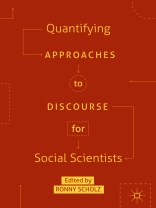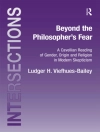This book provides an overview of a range of quantitative methods, presenting a thorough analytical toolbox which will be of practical use to researchers across the social sciences as they face the challenges raised by new technology-driven language practices. The book is driven by a reflexive mind-set which views quantifying methods as complementary rather than in opposition to qualitative methods, and the chapters analyse a multitude of different intra- and extra-textual context levels essential for the understanding of how meaning is (re-)constructed in society. Uniting contributions from a range of national and disciplinary traditions, the chapters in this volume bring together state-of-the-art research from British, Canadian, French, German and Swiss authors representing the fields of Political Science, Sociology, Linguistics, Computer Science and Statistics. It will be of particular interest to discourse analysts, but also to other scholars working in the digital humanitiesand with big data of any kind.
Spis treści
Part A. Introductory Remarks.- Chapter 1. Understanding 21st Century Societies using Quantifying Text Processing Methods; Ronny Scholz.- Chapter 2. Beyond the quantitative and qualitative cleavage: Confluence of research operations in discourse analysis; Jules Duchastel and Danielle Laberge.- Part B. Analysing the Institutional Contexts of Discourses.- Chapter 3. The academic dispositive: Towards a context-centred discourse analysis; Julian Hamann, Jens Maesse, Ronny Scholz and Johannes Angermuller.- Chapter 4. On the social uses of scientometrics: The quantification of academic evaluation and the rise of numerocracy in higher education; Johannes Angermuller and Thed van Leeuwen.- Part C. Exploring Corpora: Heuristics, Topic Modelling and Text Mining.- Chapter 5. Lexicometry: A quantifying heuristic for social scientist in discourse studies; Ronny Scholz.- Chapter 6. Words and Facts: Textual Analysis: Topic Centred Methods for Social Scientists; Karl M. van Meter.- Chapter 7. Text mining for discourse analysis: An exemplary study of the debate on minimum wages in Germany; Gregor Wiedemann.- Part D. New Developments in Corpus Assisted Discourse Studies.- Chapter 8. The Value of Revisiting and Extending Previous Studies: the case of Islam in the UK press; Paul Baker and Tony Mc Enery.- Chapter 9. The Linguistic Construction of World – an Example of Visual Analysis and Methodological Challenges; Noah Bubenhofer, Klaus Rothenhäusler, Katrin Affolter, Danica Pajovic.- Chapter 10. Multi-Method Discourse Analysis of Twitter Communication: A Comparison of Two Global Political Issues; Jörn Stegmeier, Wolf J. Schünemann, Marcus Müller, Maria Becker, Stefan Steiger and Sebastian Stier.
O autorze
Ronny Scholz coordinates the ERC-funded DISCONEX project on academic discourses at the University of Warwick, UK. He holds a Master degree in discourse studies from the University Paris XII and a Ph D in sociology and linguistics from Magdeburg and Paris-Est. His work focuses on the question of legitimisation of power in political discourses especially in the post-democratic era. He uses lexicometric tools as quantifying heuristic helping to explore new perspectives in various corpora of political discourse.












